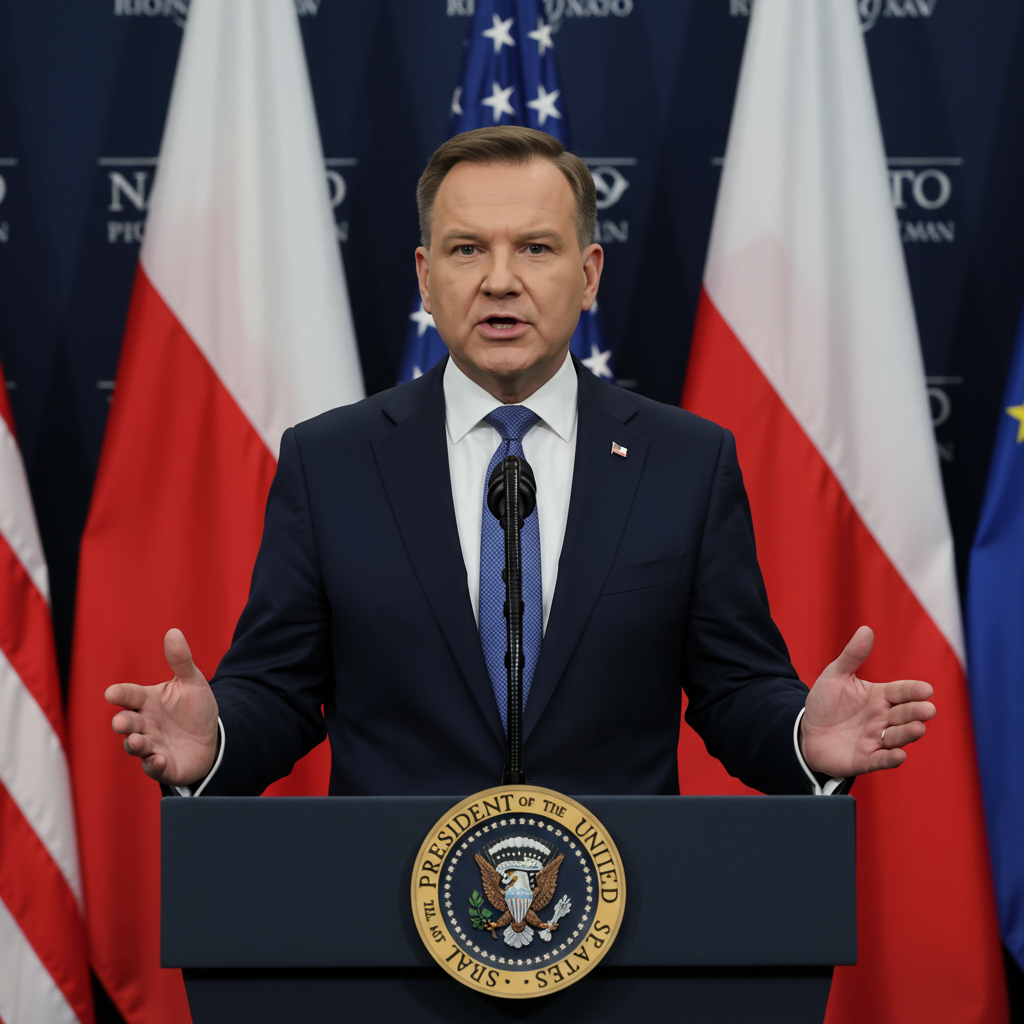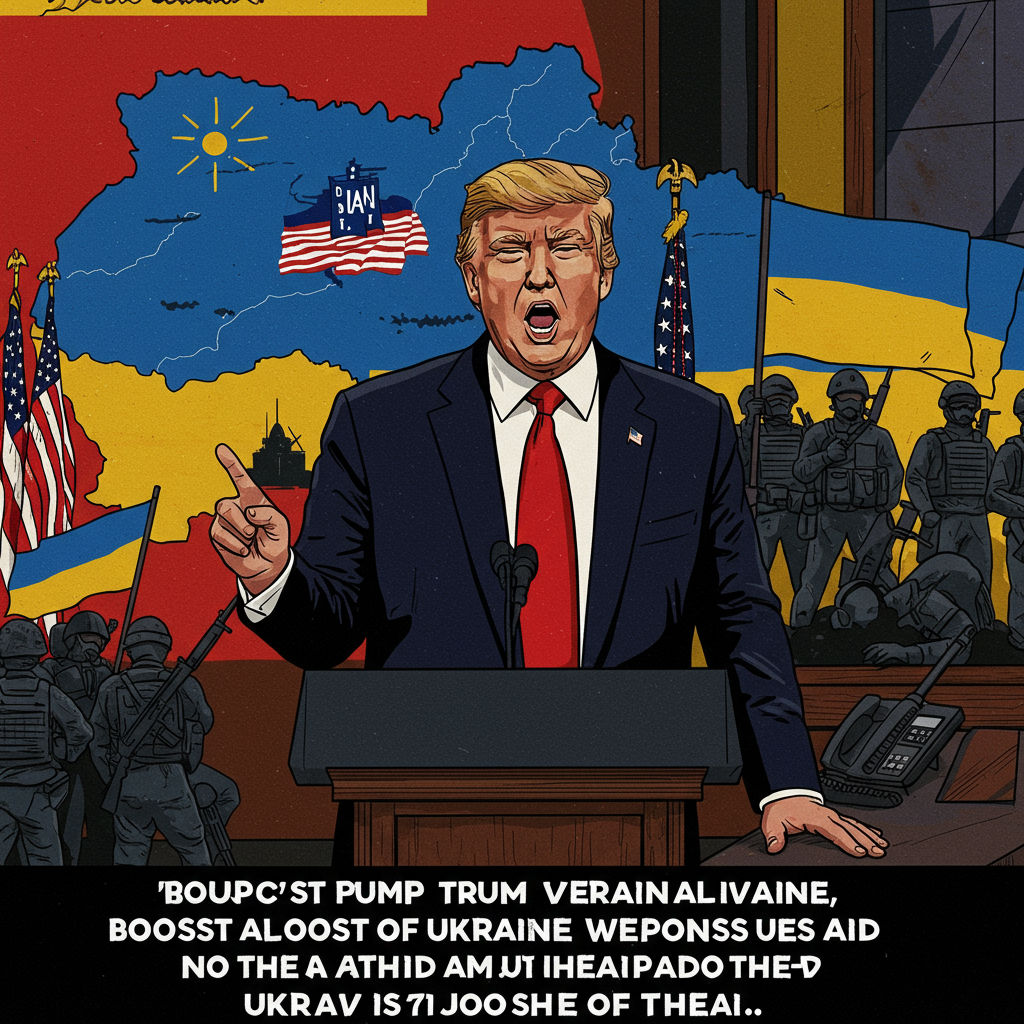A significant escalation in European tensions recently saw Poland firmly push back against former U.S. President Donald Trump’s suggestion that a major Russian drone incursion into its airspace might have been accidental. Polish leaders, backed by a unified European and NATO front, unequivocally declared the incident a deliberate and calculated act by Russia. This powerful rejection underscores the gravity of the violation, highlighting a perilous moment for NATO’s eastern flank amidst the ongoing war in Ukraine. The incursion, which prompted NATO fighter jets to scramble, signals a critical test of alliance resolve and a stark reminder of hybrid warfare’s evolving tactics.
The Unmistakable Incursion: A Deliberate Act, Says Poland
On a critical Wednesday, Russian drones breached Polish airspace, originating from Belarus. Polish authorities later recovered parts of approximately 17 to 19 Russian-made drones in the country’s eastern regions. While these “Gerbera drones,” inexpensive devices assembled from Chinese-supplied kits, caused no injuries or significant damage on the ground, their presence triggered an immediate and serious response. Polish and allied NATO fighter jets, including those from Holland and France, were scrambled for interception. This marked the first known instance of a NATO member engaging and firing shots during Russia’s full-scale invasion of Ukraine, which began over three years ago.
Polish Prime Minister Donald Tusk swiftly condemned the incident. He characterized it as a “large-scale provocation” and starkly noted it was “the closest we have been to open conflict since World War Two.” The deliberate nature of this Poland Russia drone incursion was central to Warsaw’s message, pushing back against any notion of an accidental breach.
Contrasting Narratives: Trump’s “Mistake” Versus Allied Unity
The international community watched closely as the narrative split. Former President Donald Trump, when queried about the incident, told journalists late Thursday, “It could have been a mistake.” Earlier, his social media post had queried, “What’s with Russia violating Poland’s airspace with drones? Here we go!” This speculative stance from Trump stood in sharp contrast to the unified and resolute position of Poland and its European allies.
Polish Prime Minister Donald Tusk took to social media, unequivocally dismissing Trump’s theory. “We would also wish that the drone attack on Poland was a mistake,” Tusk posted, “But it wasn’t. And we know it.” Poland’s conservative President Karol Nawrocki echoed this sentiment, describing the incursion as “nothing more than an attempt to test our capabilities and response. It was an an attempt to test the mechanisms of action within NATO and our ability to respond.” The White House, notably, did not offer any clarification regarding Trump’s initial remarks, leaving his comments isolated against a chorus of allied condemnation.
Escalation and Evidence: Why Poland Says “We Know It”
Poland’s assertion of a deliberate attack was not without substantial evidence. Deputy Defense Minister Cezary Tomczyk emphatically stated, “There’s no question of a mistake – this was a deliberate Russian attack.” Adding significant weight to this claim, Polish Foreign Minister Radoslaw Sikorski, speaking from Kyiv, provided crucial context. He highlighted that on the very same night 19 Russian drones crossed into Poland, over 400 drones and 40 missiles simultaneously entered Ukraine. “These were not mistakes,” Sikorski concluded, reinforcing the argument that the Polish incursions were part of a broader, coordinated offensive rather than isolated errors.
The timing and scale of the attack reinforced the Polish government’s conclusion. It suggested a calculated move by Moscow, potentially aimed at probing NATO’s air defenses and resolve. Polish Defence Minister Wladyslaw Kosiniak-Kamysz further articulated this, suggesting the incursion aimed to “weaken NATO’s and Poland’s willingness to support Ukraine.” Poland serves a critical role as a logistical hub for aid to Ukraine, making it a strategic target for Russian provocation.
NATO’s Firm Response and Diplomatic Fallout
The NATO airspace violation triggered a swift and coordinated response beyond Polish borders. NATO aircraft were directly involved in the interception. France deployed three Rafale fighter jets to aid in protecting Polish airspace, with President Emmanuel Macron emphasizing the security of the European continent and a refusal to yield to Russian intimidation. Germany, in a significant diplomatic step, summoned the Russian ambassador in response to the incident. German Chancellor Friedrich Merz acknowledged the incident revealed a vulnerability, noting that NATO air defenses did not work “as well as it should have.”
In a unified display of condemnation, Czech, Spanish, and Dutch foreign ministers also summoned Russian ambassadors. The UK announced new sanctions targeting Russian entities. Finnish President Alexander Stubb articulated the growing concern, calling the event a blurring of the line between war and peace. Poland formally requested a meeting of the United Nations Security Council to discuss the Russian drone incursion, scheduled for Friday afternoon. Prior to the incident, U.S. Ambassador to NATO Matthew Whitaker had affirmed the U.S. commitment to its allies, stating the U.S. stands “by our NATO Allies in the face of these airspace violations and will defend every inch of NATO territory.” NATO later announced a new initiative, “Eastern Sentry,” to strengthen Europe’s eastern flank.
The Broader Geopolitical Chessboard: Zapad-2025 and Sanctions
The drone incursion cannot be viewed in isolation. It occurred just two days before Russia and Belarus commenced a major joint military exercise, “Zapad-2025.” These drills, involving maneuvers in both countries and the Baltic and Barents Seas, are described as a show of force. They are taking place at a highly tense moment, close to the borders of NATO members Poland, Lithuania, and Latvia, placing the alliance on high alert. While the Kremlin denied any hostile intent for the drills, their timing adds another layer to the deliberate nature of the drone incident.
Amidst these military developments, diplomatic efforts intensified. The Kremlin announced a pause in peace negotiations with Ukraine, blaming European countries for hindering the process. Meanwhile, European nations are pushing for harsher measures against Moscow. Denmark, holding the EU’s rotating presidency, is advocating for a “tough as possible” 19th package of sanctions by December. These new EU sanctions Russia could target circumvention, the “shadow fleet” used for oil transport, and the financial sector, aiming for stronger transatlantic cooperation. The UK also unveiled a new package targeting 70 ships transporting Russian oil and 30 companies/individuals supplying electronics and explosives for Russian weapons, including firms in China and Turkey.
Implications for European Security and Hybrid Warfare
This Poland Russia drone incursion represents a significant moment for European security. It underscores the challenges posed by modern hybrid warfare, where inexpensive drone technology can be used to probe defenses and provoke reactions without necessarily escalating to direct kinetic conflict. The incident served as a potent reminder of the need for robust, multi-layered air defense systems capable of countering both sophisticated missiles and swarms of smaller, harder-to-detect drones. Ukraine, having extensive experience with such attacks, urged allies to rethink their air defense strategies, suggesting approaches that balance cost and effectiveness against varying threat levels.
The coordinated response from Poland and its NATO allies, alongside the diplomatic pressure at the UN and through sanctions, sends a clear message. Any breach of sovereign airspace or attempt to test collective defense will be met with a unified and firm stance. The incident highlights the continued vulnerability of NATO’s eastern borders and the ongoing, complex interplay between military actions, diplomatic maneuvering, and economic pressures in the wider Ukraine war escalation.
Frequently Asked Questions
What exactly happened during the recent Russian drone incursion into Polish airspace?
On a Wednesday, approximately 17 to 19 Russian-made “Gerbera drones” breached Polish airspace, originating from Belarus. These drones were shot down by Polish forces with the support of NATO fighter jets from Holland and France. Although no injuries or significant damage occurred, the incident was deemed a deliberate act by Poland, distinguishing it from an accident. This marked the first time a NATO member actively engaged and fired shots during Russia’s ongoing war in Ukraine.
How did NATO and other international bodies respond to Poland’s airspace violation?
NATO immediately responded by scrambling fighter jets to intercept the drones. France deployed additional Rafale jets, and Germany, Czech Republic, Spain, and the Netherlands all summoned Russian ambassadors to condemn the NATO airspace violation. Poland formally requested a meeting of the UN Security Council to discuss the incident. NATO also announced a new “Eastern Sentry” initiative to bolster Europe’s eastern flank, emphasizing the alliance’s commitment to collective defense and rejecting any notion of the incursion being a mistake.
Why is Poland so certain the drone incursion was deliberate, and what are the broader implications?
Polish officials, including Prime Minister Donald Tusk and Foreign Minister Radoslaw Sikorski, were certain the Poland Russia drone incursion was deliberate due to its timing and scale. On the same night, over 400 drones and 40 missiles simultaneously targeted Ukraine, suggesting a coordinated, large-scale Russian offensive. Polish Defense Minister Wladyslaw Kosiniak-Kamysz stated the incursion was likely an attempt to test NATO capabilities and undermine support for Ukraine. The incident highlights the evolving tactics of hybrid warfare and signifies a dangerous escalation of tensions on NATO’s borders, particularly as it coincided with major Russia-Belarus military exercises (Zapad-2025).
Conclusion
The recent Russian drone incursion into Polish airspace serves as a stark reminder of the escalating tensions on Europe’s eastern flank. Poland’s decisive rejection of any “mistake” theory, backed by a unified international response, underscores the serious implications of such provocations. This event is not merely an isolated incident; it is a critical component of Russia’s broader strategy, testing NATO’s resolve and challenging regional stability. As the Ukraine war escalation continues and military exercises intensify, vigilance and unwavering collective defense remain paramount to safeguard European security and deter further aggression. The diplomatic and military chess game will undoubtedly continue, with each move carrying profound consequences for global stability.
References
- www.yahoo.com
- www.independent.co.uk
- www.dailysabah.com
- <a href="https://www.huffpost.com/entry/poland-rejects-trump-suggestion-on-russian-drone-attackn68c3e027e4b072943c565986″>www.huffpost.com
- www.inkl.com



